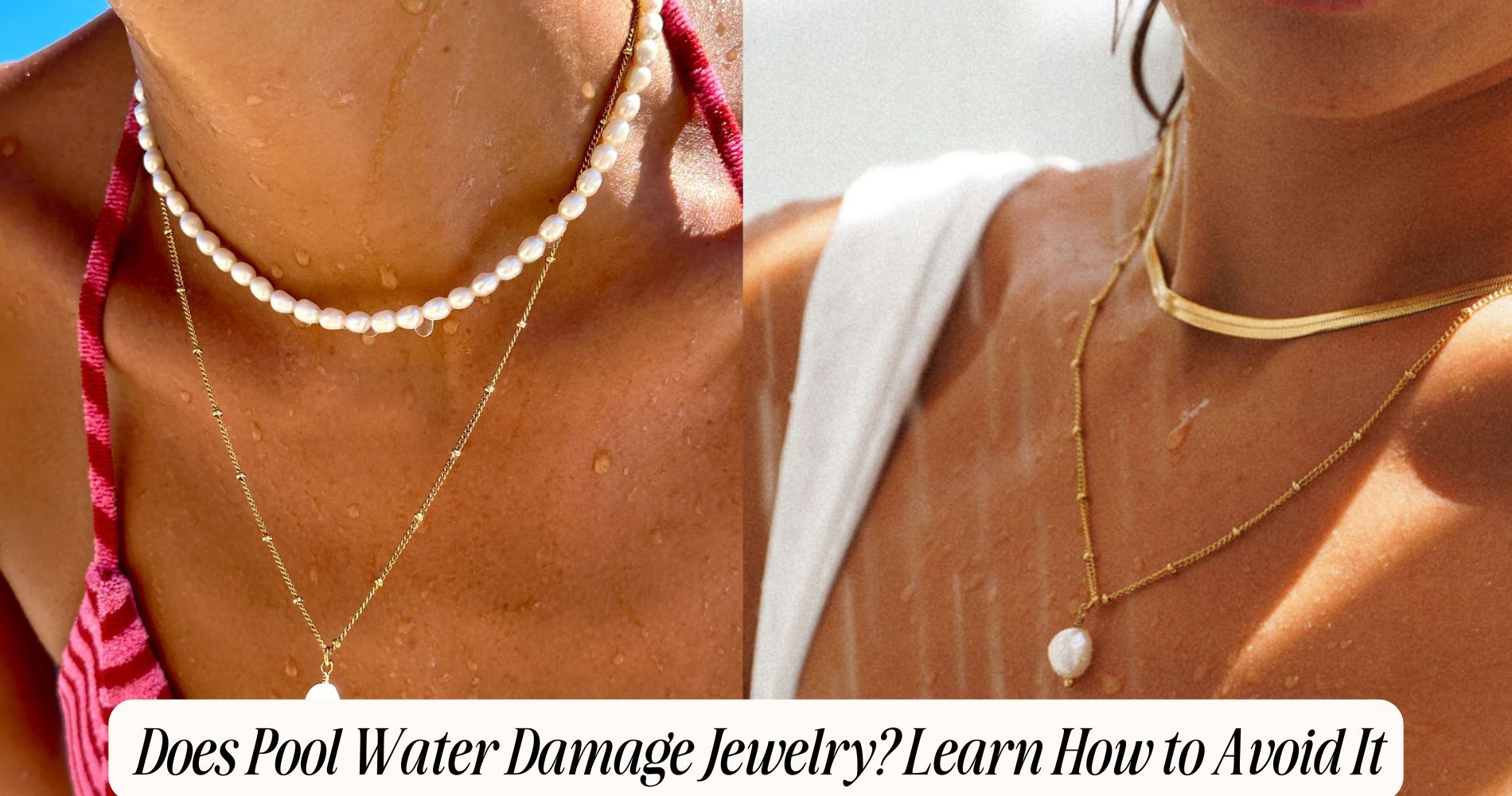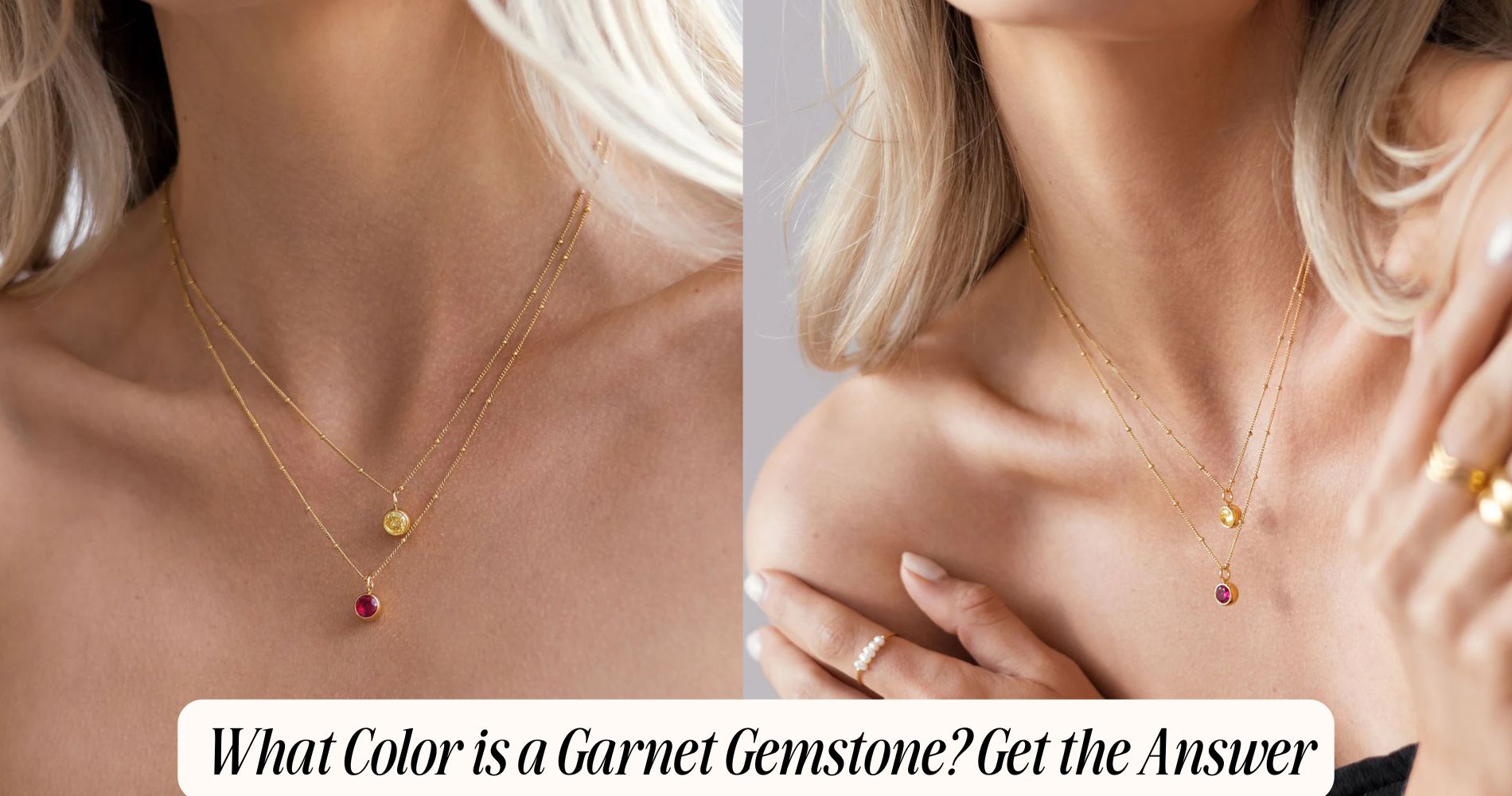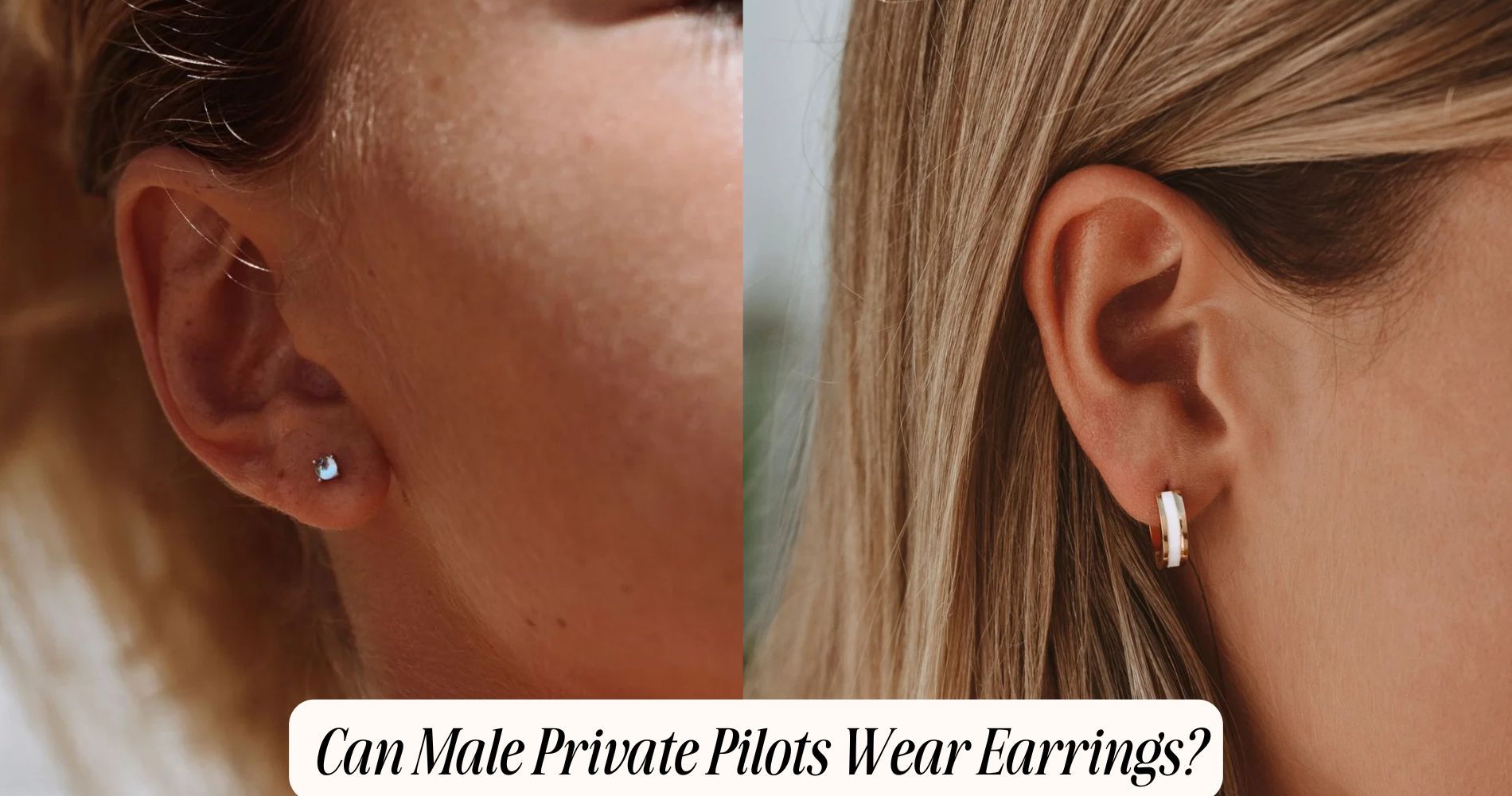
Does Pool Water Damage Jewelry? Learn How to Avoid It
If you’re wondering, does pool water damage jewelry, the answer is yes. Pool water can damage your jewelry due to the chemicals it contains, such as chlorine, bromine, and other substances. These can lead to tarnishing, discoloration, and even structural damage. Silver is particularly vulnerable, but gold and gemstones can also suffer from prolonged exposure. To protect your pieces, always remove your jewelry before swimming and rinse it with fresh water immediately afterward. Regularly testing your pool's pH and alkalinity will also help keep them within safe ranges. For more tips on maintaining your jewelry's condition and spotting signs of damage, check out additional preventative measures. And if you’re searching for elegant, everyday options, explore our minimal jewelry set collection for the perfect pieces to suit your style.
Understanding Pool Water Composition
Pool water is a complex mixture of chemicals and minerals designed to maintain hygiene and balance.
To guarantee effective sanitation, you must regularly monitor and adjust the pool pH, ideally keeping it between 7.2 and 7.8. This range prevents irritations and protects your jewelry from potential damage.
Additionally, water hardness is vital; it refers to the concentration of calcium and magnesium in the water. If the hardness is too low, it can lead to corrosive conditions that may harm your jewelry. Conversely, high hardness can cause scaling, affecting both your pool's appearance and your accessories.
Regular testing and balancing of both pool pH and water hardness are essential to safeguard your jewelry while enjoying your swimming experience.
How Chlorine Affects Jewelry
Chlorine, a common disinfectant in pool water, can have significant effects on your jewelry, especially if it's made from metals like silver, gold, or certain alloys. Prolonged chlorine exposure can lead to discoloration, tarnishing, and even structural damage.
For example, chlorine can weaken gold alloys, causing potential breakage. If you want to maintain your jewelry's longevity, it's essential to minimize its contact with pool water.
Always remove your pieces before swimming and rinse them thoroughly with fresh water if they accidentally get wet. Additionally, store your jewelry in a dry, cool place to prevent any residual chlorine from causing further damage.
Other Chemicals in Pool Water
While you may be aware of chlorine's impact on your jewelry, other chemicals found in pool water can also pose risks.
Many pool chemicals, including bromine and algaecides, can lead to discoloration or corrosion of certain metals. Additionally, imbalances in water balance, such as pH and total alkalinity, can exacerbate these effects.
For instance, acidic water can cause tarnishing, especially on silver, while alkaline conditions may affect the integrity of gemstones.
To protect your jewelry, consider rinsing it with fresh water immediately after swimming, and avoid prolonged exposure to pool environments.
Regularly checking and maintaining appropriate water balance in your pool will also help minimize the impact of these chemicals on your jewelry.
Types of Jewelry Most Affected
Certain types of jewelry are more vulnerable to the damaging effects of pool water. Silver jewelry, for instance, can tarnish rapidly when exposed to chlorine, resulting in discoloration and a dull appearance.
If you frequently wear silver pieces, it's important to remove them before swimming. Gold jewelry, while more resistant, can still suffer under harsh conditions. Chlorine can weaken the alloy, making gold jewelry more prone to scratches and damage.
Additionally, any gemstones set in these metals may also be affected. To protect your valuables, always take off your silver and gold jewelry before entering the pool.
This simple precaution can help maintain their shine and longevity, ensuring they remain in excellent condition for years to come.
Signs of Jewelry Damage
You need to watch for specific signs that indicate your jewelry has suffered damage from pool water.
Discoloration of metal, dullness of stones, and corrosion on settings are key indicators that require immediate attention.
Identifying these issues early can help prevent further deterioration of your valuable pieces.
Discoloration of Metal
Discoloration of metal in jewelry can signal underlying damage, often caused by prolonged exposure to pool water. Chlorine and other chemicals in pool water can provoke metal reactions, particularly with softer metals like silver and copper.
If you notice a change in color, it's essential to address it promptly. Regular jewelry maintenance is important; clean your pieces after swimming to remove any chlorine residue. Use a mild soap solution and a soft brush, then rinse thoroughly with fresh water.
For valuable pieces, consider storing them away from poolside activities to prevent exposure. By being proactive, you can greatly reduce the risk of discoloration and extend the life of your jewelry.
Dullness of Stones
A noticeable dullness in gemstones often indicates damage, especially when exposure to pool water occurs.
This dullness results from chemical reactions between chlorine and the stone, which can strip away protective coatings or damage the stone's surface.
To maintain your jewelry's brilliance, prioritize proper gemstone care. Rinse your jewelry with fresh water immediately after swimming to minimize chemical exposure.
When storing, use soft pouches or dedicated jewelry boxes to prevent scratches.
Regularly inspect your gemstones for signs of dullness, and consider professional cleaning for deeper restoration.
By following these guidelines, you'll guarantee effective stone preservation, keeping your jewelry looking vibrant and beautiful for years to come.
Corrosion on Settings
Chemical exposure from pool water not only affects gemstones but can also lead to corrosion on the metal settings of your jewelry.
This corrosion can weaken the structure and compromise the integrity of your pieces, especially if they're made from susceptible jewelry materials like silver or gold-plated metals.
To prevent corrosion, rinse your jewelry with fresh water immediately after swimming, ensuring you remove any chlorine residue.
Dry your pieces thoroughly with a soft cloth to avoid moisture retention.
Additionally, consider applying a protective sealant designed for jewelry to enhance corrosion prevention.
Regularly inspect your settings for signs of wear, and store your jewelry in a dry, cool place when not in use to minimize exposure to damaging elements.
Preventative Measures to Consider
To protect your jewelry from potential pool water damage, it's essential to take proactive measures before diving in.
First, consider preventative storage; keep your jewelry in a dry, secure location away from the pool area. Use a jewelry box with compartments to prevent scratching and tangling.
Additionally, applying protective coatings can create a barrier against chlorine and other chemicals. Look for jewelry-specific sprays or waxes that offer a layer of protection without altering the appearance of your pieces.
Finally, remove any jewelry before entering the pool. This simple action reduces exposure to damaging elements, preserving both the metal and any gemstones.
Care Tips for After Swimming
After swimming, rinse your jewelry with fresh water to remove chlorine and other chemicals that can cause damage.
Store your pieces safely in a dry, cool place to prevent scratches and tarnishing.
Establish a regular cleaning routine to maintain their shine and integrity.
Rinse Jewelry After Swimming
When you finish swimming, it's vital to rinse your jewelry promptly to prevent any potential damage. Chlorine and other chemicals in pool water can corrode metals and dull gemstones if left unaddressed.
To effectively rinse jewelry, use lukewarm, clean water; hot water can cause some materials to expand and potentially fracture. Gently scrub pieces with a soft toothbrush to remove any residue, especially in crevices.
After rinsing, pat your jewelry dry with a soft cloth. Make sure you're taking swimming precautions by removing any delicate or porous items before diving in.
This simple rinsing routine can greatly extend the life of your jewelry, keeping it looking its best after your swim. Don't skip this essential care step!
Store Jewelry Safely
Once you've rinsed and dried your jewelry, proper storage is key to maintaining its condition. Choose safe containers specifically designed for jewelry storage.
These containers should offer protection from moisture, dust, and scratches. Avoid using plastic bags, as they can trap humidity and promote tarnishing. Instead, opt for velvet pouches or rigid boxes with compartments to keep pieces separate.
Ensure that the storage area is cool, dry, and away from direct sunlight. For additional protection, consider using anti-tarnish strips in your containers.
Finally, regularly check your jewelry for any signs of damage or tarnish, and store them promptly after use. By following these guidelines, you'll preserve your jewelry's beauty and longevity.
Regular Cleaning Routine
To maintain your jewelry's integrity, it's essential to establish a regular cleaning routine after swimming. Aim to clean your jewelry immediately after exposure to pool water.
Depending on your swimming frequency, consider a cleaning schedule of at least once a week. Use gentle cleaning solutions, such as a mixture of mild dish soap and warm water.
Soak your jewelry for a few minutes, then use a soft brush to remove any residues. Rinse thoroughly under clean water to eliminate any soap residue.
Dry your pieces with a soft cloth to prevent water spots and tarnishing. Regular maintenance not only preserves the shine but also extends the lifespan of your jewelry, safeguarding your investment against pool-related damage.
Frequently Asked Questions
Can Saltwater Pools Also Damage Jewelry?
Yes, saltwater pools can damage jewelry. The saltwater effects can corrode metals and weaken settings. To maintain your jewelry, rinse it after exposure and store it properly to prevent long-term damage. Regular maintenance is essential.
How Often Should I Clean My Jewelry After Swimming?
You should clean your jewelry after swimming to prevent buildup of chlorine or salt. Follow jewelry maintenance tips and swimming precautions; a gentle rinse with fresh water keeps your pieces looking their best and extends their lifespan.
Is There a Safe Way to Swim With Jewelry On?
You can swim with jewelry if you choose the right materials. Avoid chlorine-sensitive metals, and consider wearing waterproof pieces. Always take precautions, like rinsing your jewelry afterward to maintain its integrity and shine.
Can I Repair Damaged Jewelry at Home?
You can repair damaged jewelry at home using various repair methods. Start by cleaning your jewelry thoroughly, then assess the damage. Use appropriate tools and techniques, like pliers or adhesive, to restore its original condition effectively.
What Types of Jewelry Are Safest to Wear in Pools?
When swimming, opt for jewelry made from durable materials like stainless steel or silicone. These materials withstand water exposure better, ensuring minimal exposure to chlorine or salt, which can damage more delicate pieces.
Conclusion
In summary, pool water can indeed damage your jewelry, primarily due to chlorine and other chemicals. To protect your valuables, consider removing them before swimming and storing them safely. Regularly inspect your jewelry for signs of damage, such as discoloration or dullness. After swimming, rinse your pieces with fresh water and dry them thoroughly. By following these preventive measures and care tips, you can greatly extend the life and luster of your jewelry.























Leave a comment
This site is protected by hCaptcha and the hCaptcha Privacy Policy and Terms of Service apply.